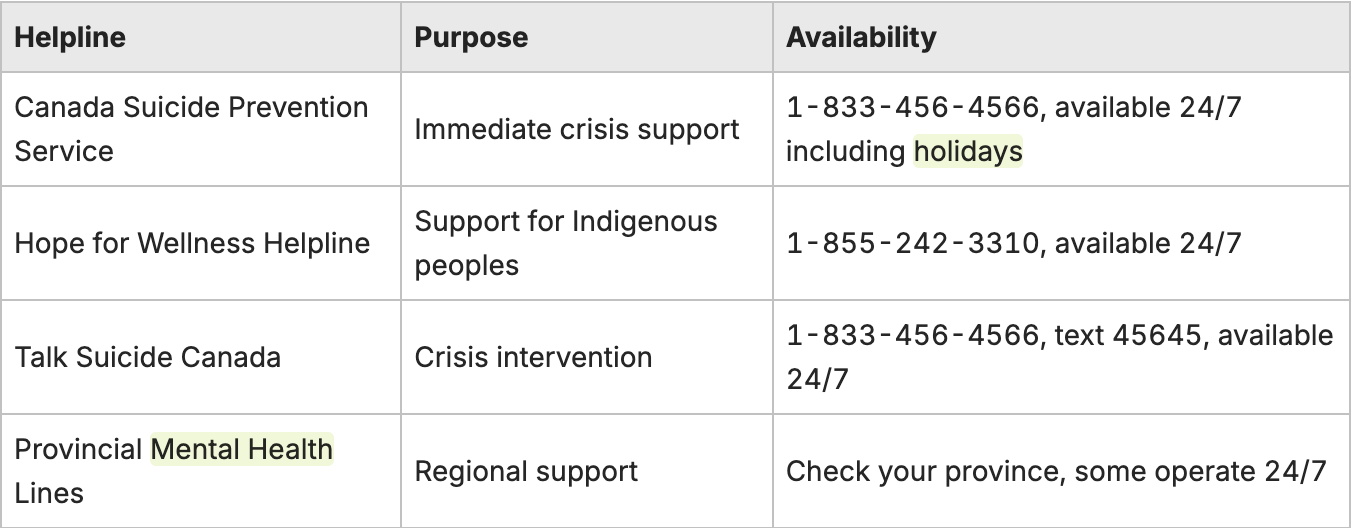Your Essential Guide to Navigating Thanksgiving in Recovery
This Thanksgiving recovery toolkit brings together proven strategies and expert advice to help you stay sober during October's long weekend. With family gatherings concentrated into a shorter timeframe and the transition into fall intensifying emotional challenges, having a specific set of tools can be your key to preventing relapse and building emotional strength.
This guide dives into the common triggers that can challenge addiction recovery during Thanksgiving, outlines essential items to pack, identifies who to contact when temptation calls, and shares proactive planning techniques. You'll learn how to cultivate self-care habits, establish firm boundaries, involve loved ones in supportive ways, and maintain your momentum through the fall and winter months ahead. By identifying your triggers, assembling your personal toolkit, connecting with trusted individuals, and practicing assertiveness, you'll create a solid plan for a sober Thanksgiving and lasting recovery throughout the darker seasons.
Understanding Holiday Triggers in Addiction Recovery
Common Thanksgiving Triggers That Threaten Sobriety
Thanksgiving triggers in addiction recovery include the pressures and emotional challenges unique to our October long weekend that can increase the risk of relapse by disrupting your usual routines and sparking cravings. These triggers work on both psychological and social levels—the transition into shorter days and colder weather can heighten seasonal depression, concentrated family time over a three-day weekend can stir up emotional pain, and the beginning of the holiday season can fuel anticipatory anxiety—all of which can undermine your efforts to stay sober. For instance, tension during a Sunday dinner might lead to cravings as a familiar way to cope, while the fall weather shift can trigger mood changes that challenge your recovery.
How Do Shorter Days and Fall Weather Affect Sobriety?
The transition to shorter October days and cooler weather can significantly impact sobriety by triggering seasonal affective symptoms, reducing motivation for outdoor activities, and increasing isolation. The earlier sunsets and dramatic fall weather changes characteristic of October can intensify feelings of loneliness and depression. Studies indicate that seasonal changes are linked to increased relapse risk, making light therapy, vitamin D supplementation, and maintaining outdoor routines crucial parts of any fall sobriety plan.
What Role Do Condensed Family Gatherings Play in Relapse Risk?
The condensed three-day weekend format can intensify relapse risk by concentrating family interactions into a shorter timeframe with less escape time between gatherings. Multiple family obligations packed into Saturday through Monday mean less breathing room between events. The pressure to attend multiple dinners, navigate competing family demands, and manage travel within a tight window can overwhelm coping resources and test your resolve.
How Can the Start of Holiday Season Increase Relapse Risk?
Thanksgiving marks the unofficial start of the holiday season, creating anticipatory anxiety about the months ahead. Knowing that Halloween, Remembrance Day, and the December holidays are approaching can trigger worry about multiple upcoming challenges. This "preview" effect can lead to catastrophic thinking about managing an entire season of celebrations, making it essential to focus on one weekend at a time rather than projecting forward.
Which Fall-Specific Emotional Factors Should Individuals in Recovery Watch For?
Fall-specific factors such as back-to-school transitions, harvest season nostalgia, and the approach of winter can increase relapse risk by destabilizing your emotional state. For families, September's school routines settling may lead to October exhaustion. Rural individuals may experience harvest-related stress or memories of past celebrations tied to agricultural cycles. The awareness that winter's isolation is approaching can create preemptive anxiety about months of limited daylight and outdoor activity.
Building Your Thanksgiving Sobriety Toolkit
Essential Items for Your Recovery Toolkit
A practical Thanksgiving recovery toolkit should include items that address both the three-day weekend format and fall weather challenges. By packing warm-weather comfort items, fall-themed non-alcoholic beverages, a clear exit plan for multiple gatherings, a dedicated sober companion, and a gratitude journal, you can address both physical cravings and seasonal stressors.
Which Non-Alcoholic Beverages Are Best for a Sober Thanksgiving?
Mocktails featuring fall flavors provide delicious alternatives that honor seasonal traditions without alcohol. These drinks can resemble traditional Thanksgiving beverages while celebrating local ingredients.
What Self-Care Items Support Fall Well-Being?
Self-care items for Thanksgiving should account for indoor activities and cooler weather. A cozy flannel blanket, a light therapy lamp for shorter days, warm comfort foods, seasonal aromatherapy (pine, cedar, maple scents), and outdoor gear for fall walks can help buffer seasonal emotional pressure.
How Do You Create an Exit Strategy for Multiple Weekend Gatherings?
The three-day format often means multiple family obligations. An effective exit strategy accounts for this:
Plan which gatherings are mandatory and which are optional
Build in recovery time between Saturday, Sunday, and Monday events
Have your own transportation to avoid being stranded
Set specific time limits for each gathering (e.g., 2 hours maximum)
Create a valid excuse for early departure that you can use consistently
Schedule a recovery activity for Tuesday to decompress
The Importance of a Sober Buddy During Holidays
A sober buddy provides accountability across multiple days and events, offering support not just for one dinner but throughout the entire long weekend. Having someone check in Saturday morning, Sunday afternoon, and Monday evening creates consistent touchpoints when the compressed timeline makes isolation risky.
How Can a Gratitude Journal Enhance Your Thanksgiving Recovery?
A gratitude journal can improve your recovery by focusing on Thanksgiving themes: harvest abundance, community support, and resilience heading into winter. Writing about three things you're thankful for—perhaps including preparation for winter, local connections, or recovery milestones—can activate well-being pathways while acknowledging the seasonal transition ahead.
Who Should You Call for Support During the Thanksgiving Long Weekend?
Identifying contacts who will be available during the October long weekend is essential, as some services may have reduced hours. Your support network should include people accessible throughout Saturday, Sunday, Monday, and the transition back to work on Tuesday.
24/7 Crisis Lines and Helplines for Recovery
Planning Your Sober Thanksgiving Strategy
Steps to Create Your Holiday Sobriety Plan
Preparing for Thanksgiving means planning for the compressed timeline, cooler weather, and the reality that you may have limited recovery meeting access over the three-day weekend.
What Steps Are Essential for Your Holiday Sobriety Plan?
Identify Saturday, Sunday, and Monday commitments separately
Plan outdoor activities that work in October weather (fall walks, pumpkin patches)
Schedule virtual recovery meetings since in-person gatherings may be cancelled for the long weekend
Stock up on comfort foods and self-care supplies before stores close
Arrange for light therapy or vitamin D if seasonal depression is a concern
Create a Tuesday recovery plan to decompress after the intense weekend
How Do You Set Boundaries Around Thanksgiving Traditions?
Thanksgiving traditions like turkey dinners, football watching, and harvest-themed activities may have strong family expectations attached. Setting boundaries means:
Communicating in advance if you won't participate in drinking-centered traditions
Offering to bring non-alcoholic beverages to share
Suggesting alternative activities like fall hikes or board games
Honoring the harvest theme through gratitude practices rather than consumption
How Can You Create New Sober Thanksgiving Traditions?
Replace old habits with recovery-focused traditions:
Volunteer at a local food bank or community dinner
Organize a "Friendsgiving" with your recovery community
Host a mocktail exchange featuring seasonal ingredients
Take a gratitude walk in fall colors
Attend Thanksgiving Day recovery meetings (check for special sessions)
Create a harvest gratitude circle celebrating recovery milestones
Why Is Maintaining Routine Critical During the Long Weekend?
The three-day weekend disrupts weekly routines more than a regular weekend. Maintaining structure—attending virtual meetings if in-person are cancelled, keeping regular sleep times despite Monday being a holiday, and planning Tuesday's return to routine—prevents the disorientation that increases relapse risk.
Self-Care and Stress Management for Holiday Sobriety
Mindfulness Practices for Managing Holiday Stress
Mindfulness supports holiday sobriety by helping you focus on the present moment, reducing the tendency to dwell on past conflicts or future worries. A daily 10-minute guided meditation can lower cortisol levels and improve emotional awareness, allowing you to recognize cravings earlier.
Exercise and Nutrition in Recovery
Regular exercise and balanced nutrition can improve recovery by regulating neurotransmitters linked to mood and impulse control. Aerobic activities like brisk walking or cycling release endorphins that boost mood, while a diet rich in lean protein and complex carbohydrates helps stabilize blood sugar and reduce irritability.
The Role of Quality Sleep in Emotional Regulation
Quality sleep is vital for emotional regulation because restorative rest helps recalibrate stress-response systems and consolidate memories. Insufficient sleep can increase amygdala activation, leading to heightened reactivity to triggers. Maintaining a consistent sleep schedule—aiming for seven to eight hours per night—enhances cognitive resilience.
Effective Coping Skills for Holiday Pressure
Effective coping skills include deep-breathing exercises, progressive muscle relaxation, guided imagery, and brief journaling. Each technique helps activate the parasympathetic nervous system, lowering heart rate and promoting a sense of calm.
How Loved Ones Can Support Recovery During Thanksgiving
Best Practices for Family Communication
Open and supportive communication involves active listening, validating feelings, and avoiding judgment or unsolicited advice. Family members can ask gentle questions like, "How can I support you today?" and reflect back statements to ensure understanding.
Educating Families About Addiction and Recovery
Families can enhance their ability to support by learning about addiction as a chronic health condition, exploring reputable resources from national organizations, and participating in community education events. Understanding the neurobiology of addiction and the principles of relapse prevention fosters empathy and dispels stigma.
Creating a Safe and Peaceful Holiday Environment
Promoting a peaceful environment involves creating alcohol-free zones, offering a variety of non-alcoholic drink options, and planning group activities that focus on connection rather than consumption. Establishing quiet spaces for reflection or mindfulness breaks can reduce sensory overload.
Long-Term Recovery Resources Beyond Thanksgiving
Support Groups and Recovery Programs for Fall and Winter
Support groups that operate during fall and winter include:
AA and NA meetings continue throughout fall (check for Thanksgiving weekend schedule changes)
SMART Recovery Canada offers online meetings
Provincial mental health programs provide ongoing support
Indigenous-led recovery circles honor cultural healing practices
Faith-based recovery groups often have seasonal programs
Online Communities for Continuous Recovery Support
Online communities offer 24/7 peer support through forums, social media groups, and virtual meetings. These platforms allow for immediate sharing of challenges, success stories, and coping tips, reducing isolation outside of scheduled in-person events.
How Fall Transitions Impact Long-Term Recovery
Thanksgiving is just the beginning of the darker, colder months. Building resilience now—through light therapy routines, winter activity plans, and seasonal self-care—sets the foundation for navigating Remembrance Day, December holidays, and the long winter months when isolation and seasonal depression peak.
When to Seek Professional Help for Seasonal Challenges
If you notice seasonal depression worsening, increased isolation due to weather, or anticipatory anxiety about winter ahead, consult with a therapist or addiction specialist who understands seasonal challenges. Early intervention in October can prevent crisis in January or February.
Reflecting on Gratitude for Sustained Sobriety
Reflecting on gratitude helps sustain long-term sobriety by reinforcing positive neural pathways associated with well-being and resilience. Keeping a gratitude journal beyond Thanksgiving encourages daily acknowledgment of progress, strengthens motivation, and provides a buffer against stress.
Conclusion: Your Path to a Sober Thanksgiving
Navigating recovery during Thanksgiving requires preparation for the compressed long weekend format, fall weather transitions, and the beginning of the challenging darker months ahead. With a personalized toolkit, clearly defined boundaries for multiple family gatherings, and support contacts available throughout the three-day weekend, you can confidently approach October's holiday without compromising your sobriety. Dunham House understands the unique challenges Thanksgiving presents and offers comprehensive support for navigating recovery through our seasonal transitions.
Dunham House
About Dunham House
Located in Quebec's Eastern Townships, Dunham House is a residential treatment centre specializing in addiction and providing support to individuals with concurrent mental health challenges. We are the only residential facility of our kind in Quebec that operates in English.
Our evidence-based programs include a variety of activities such as art, music, yoga, and equine-assisted therapy. In addition to our residential services, we offer a full continuum of care with outpatient services at the Queen Elizabeth Complex in Montreal.







